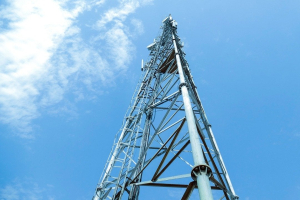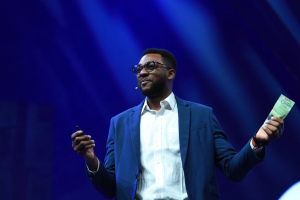Equipe Publication
Afrique du Sud : la fintech e4 acquise par un consortium d'investisseurs pour plus de 52 millions $
e4, une société de technologie financière basée en Afrique du Sud, a annoncé le lundi 15 mai son acquisition par un groupe d'investisseurs en capital-investissement, dirigé par le gestionnaire de fonds indépendant Infinite Partners.
La transaction, évaluée à plus de 1 milliard de rands (52,5 millions $), permettra à e4 d'obtenir les capitaux nécessaires pour passer à l'étape suivante de son expansion.
Lire aussi :
Congo and Equatorial Guinea discuss digital cooperation
Last weekend, Congolese Minister of Posts and Telecommunications Leon Juste Ibombo (photo, right) granted an audience to Guinean Minister of Transport, Evita Oma Honorato (photo, left).
The two officials discussed future agreements to develop the ICT sector in their respective countries. The envisaged cooperation will focus on mobile money interoperability and the implementation of the Oyola training project.
Au Zimbabwe, Smart Africa a signé divers partenariats, notamment dans l'accès à Internet et la cybersécurité en Afrique
Pour réussir l’inclusion numérique de la population et la transformation 4.0 du continent, la Smart Africa Alliance a besoin de la collaboration de plusieurs acteurs. L’organisation publique-privée a récemment signé plusieurs partenariats à cet effet.
Dans le cadre de la 6e édition du Transform Africa summit, qui s'est ouvert le 26 avril au Zimbabwe et s'achève aujourd'hui 28 avril, la Smart Africa Alliance a signé plusieurs accords de partenariat. Ils permettront à l'organisation panafricaine qui promeut la transformation numérique du continent dans tous les secteurs clés de renforcer cette vision prioritaire.
Parmi les accords signés, figurent des partenariats avec Internet Society, Hitachi Systems Security, Estonian ICT, l'université de Zhejiang et Innovation for Policy foundation (i4Policy).
Avec Internet Society, Smart Africa a signé un protocole d’entente visant à collaborer sur divers aspects, notamment le développement de réseaux communautaires, la mesure de la résilience et de la fiabilité d'Internet et le renforcement des capacités.
Smart Africa and Internet Society signed #MoU to collaborate in various aspects, including community network development, measuring internet resilience and reliability, and capacity building. #TAS2023 #digitaltransformation pic.twitter.com/roiPvuMCPj
— Smart Africa Org (@RealSmartAfrica) April 27, 2023
Avec la société canadienne Hitachi Systems Security, Smart Africa ambitionne d'assister et de soutenir le cyberespace africain entre autres.
Smart Africa and @HitachiSysSec enter #MoU to assist and support Africa’s secure #digitaltransformation and to secure the African cyberspace to facilitate the realization of the African Continental Free Trade Area and Digital Single Market #TAS2023 pic.twitter.com/BtLgH6XXGa
— Smart Africa Org (@RealSmartAfrica) April 27, 2023
L’accord avec Estonian ICT, une association estonienne des technologies de l'information et des télécommunications, prévoit la conception, le développement, le déploiement et l'exploitation d'infrastructures publiques numériques sur le continent.
Estonian Association of Information Technology & Telecommunications @EstonianIct signed a #MoU with Smart Africa Alliance to collaborate on the design, development, deployment and operation of digital public infrastructure for the common good. #TAS2023 pic.twitter.com/tJKImaC6n5
— Smart Africa Org (@RealSmartAfrica) April 27, 2023
La collaboration avec l'Université de Zhejiang contribuera à la production et à la diffusion des connaissances à travers la Smart Africa Digital Academy (SADA).
Smart Africa has signed today an agreement with Zhejiang University to facilitate the production and dissemination of knowledge through our capacity-building vehicle @SADASmartAfrica pic.twitter.com/U7h555FHbj
— Smart Africa Org (@RealSmartAfrica) April 27, 2023
Avec Innovation for Policy foundation, la Smart Africa envisage une collaboration sur divers sujets conformes à leur vision et mission respectives. I4Policy milite et fait du lobbying pour l'adoption de politiques favorables à l'innovation dans divers secteurs, notamment le numérique.
Innovation for Policy Foundation @i4policy and Smart Africa Alliance entered into #MoU to collaborate on various topics consistent with their respective vision and mission. #TAS2023 #digitaltransformation pic.twitter.com/VkDYQYfGvj
— Smart Africa Org (@RealSmartAfrica) April 27, 2023
Signalons que ces nouvelles collaborations s'ajoutent à celle signée le mardi 25 avril avec le Fond africain de développement (FAD) pour le lancement du projet IDECT visant à booster le commerce électronique en Afrique
Lire aussi :
Smile Identity acquiert la société ghanéenne Inclusive Innovations pour renforcer ses services en Afrique
Smile Identity, un partenaire de conformité KYC (connaissance du client) et de vérification d'identité pour de nombreuses fintech et entreprises africaines, a annoncé le mercredi 26 avril l'acquisition d'Inclusive Innovations, la société mère d'Appruve, un développeur ghanéen de logiciels de vérification d'identité.
Cette acquisition stratégique permettra à Smile Identity d'étendre sa présence en Afrique et de consolider sa position de fournisseur important de services de vérification d'identité et d'identification des clients numériques du continent.
Great news everyone! We're thrilled to announce that Smile Identity has acquired @Appruve parent company (Inclusive Innovations, Inc.), and we couldn't be more thrilled about what this means for our future. pic.twitter.com/XXeodEZgBc
— Smile Identity (@SmileIdentity) April 26, 2023
Lire aussi :
Afrique du Sud : la start-up Ramp lève 5 millions $ pour rationaliser le processus d'intégration des nouveaux clients
Ramp, une start-up sud-africaine spécialisée dans la veille stratégique, a récemment clôturé un cycle de financement de démarrage de 5 millions de dollars. La levée de fonds d'amorçage a été menée par AlbionVC, avec la participation d'Eurazeo.
Le nouveau financement servira à rationaliser le processus d'intégration des nouveaux clients.
Lire aussi :
Eagle Towers obtient un prêt garanti de 5,5 millions $ pour combler le fossé numérique en Afrique du Sud
Eagle Towers, une entreprise qui construit, exploite et entretient des tours de télécommunications en Afrique du Sud, en particulier dans les zones rurales, a obtenu un prêt garanti de 100 millions de rands (environ 5,5 millions de dollars) auprès de Infra Impact Investment Managers, une société sud-africaine d'investissement dans les infrastructures.
Le prêt obtenu permettra à l'entreprise de combler le fossé numérique en fournissant un accès à l'information, à la communication et aux services aux personnes vivant dans des zones reculées.
Lire aussi :
La start-up panafricaine Kora lance un nouveau service d'acquisition de cartes en dollars en Afrique
Kora, une start-up panafricaine spécialisée dans les paiements, a lancé un service d'acquisition de cartes en dollars, permettant aux commerçants de sa plateforme d'accepter des paiements en dollars américains.
En introduisant l'acquisition de cartes en USD, Kora prévoit de permettre à ses commerçants de créer des entreprises mondiales et de contribuer à accélérer la participation de l'Afrique au commerce mondial.
Merchants on Kora can now accept payments in US dollars! 😁https://t.co/R96wyNAMYe
— Kora (@thekorahq) March 27, 2023
Lire aussi :
Au Ghana, Dash met en place un réseau de paiement alternatif
La start-up logistique nigériane Fez Delivery lève 1 million $ pour accélérer son expansion en Afrique
L’entreprise nigériane de logistique et livraison au dernier kilomètre Fez Delivery a obtenu un financement d’amorçage de 1 million $. Cette ressource a été octroyée par un pool d’investisseurs amenés par la société panafricaine de capital-risque Ventures Platform.
Le financement permettra à Fez Delivery de se renforcer sur le marché de la logistique et du transport. Sur le long terme, l’entreprise compte s’étendre à d’autres marchés africains comme le Kenya, le Ghana et l’Afrique du Sud.
🥁🥁 It’s an exciting day for us!
— FEZ DELIVERY (@fezdeliveryco) March 28, 2023
We just announced our first institutional round of $1 million in Seed funding backed by world-class investors. pic.twitter.com/MYIjaiElcO
Lire aussi :
Nigeria : la Commission des communications délivre un permis d'atterrissage à E-Space
L'augmentation de la connectivité, l'essor du smartphone, la baisse des coûts des capteurs, le développement du cloud… offrent aux Africains l'opportunité de devenir de véritables acteurs du développement de l'Internet des objets. Le Nigeria ambitionne à cet effet d'investir dans le domaine.
E-Space, une société mondiale de communication par satellite, a annoncé le lundi 20 mars l’obtention des droits d'atterrissage au Nigeria pour sa constellation imminente de satellites en orbite terrestre basse (LEO).
Cet accord délivré par la Commission nigériane des communications donne le droit à E-Space de déployer son système satellitaire qui « fournira des services de communication et connectera des dispositifs de l'Internet des objets (IoT) dans tout le Nigeria, dans de nombreuses parties du pays parmi les plus difficiles à atteindre et en particulier dans les zones actuellement non desservies par les fournisseurs terrestres », lit-on dans le communiqué d'E-Space.
E-Space is proud to receive our landing rights in Nigeria — one of the most dynamic and forward-thinking markets for communications initiatives in Africa.
— E-Space, Inc. (@ESpace_Inc) March 20, 2023
#nigeria #iotsolutions #ict #ESpace #LEOSatellite #Satellitehttps://t.co/Inyr0YwrE2 pic.twitter.com/64BC6yVvNy
Le Nigeria fait partie des nombreuses nations qui exploitent l’Internet des objets pour répondre à une grande variété de défis nationaux, tout en mettant en œuvre des solutions pour développer leur économie. En 2018, le géant américain IBM et l’agritech Hello Tractor, présente au Nigeria et au Kenya, se sont associés pour développer une plateforme, basée notamment sur l’IA et la blockchain, au profit des agriculteurs africains. Le partenariat a permis d'installer des objets connectés dotés de capteurs dans les champs tout au long de l’année pour récolter et transmettre des données sur la pluviométrie, les prédateurs des plantes, l’usage des intrants, etc.
L’autorisation d’atterrissage délivré par de la Commission nigériane des communications ouvre une nouvelle ère dans le domaine préparant ainsi le terrain d’une future collaboration entre E-Space et le gouvernement, les entreprises et les communautés du pays pour construire l'écosystème et les applications nécessaires pour développer l'économie locale et créer de nouveaux emplois dans une gamme de domaines, y compris l'ingénierie, l'analyse de données.
Lire aussi :
Commentl’Afriques’appropriel’InternetdesObjetspourdéveloppersonsecteuragricole
Le Cap-Vert accueille le Sommet du leadership le 23 mars
Le Cap-Vert accueillera le 23 mars à l'Assemblée nationale le Sommet du leadership sur le thème « Nouveau leadership numérique ». Les intervenants nationaux et internationaux discuteront des défis auxquels sont confrontés les dirigeants face à la transformation technologique.
Signalons que c'est la première fois que le Sommet du leadership, organisé au Portugal depuis 2017, se déroule dans un autre pays.
Lire aussi :
Le Zimbabwe accueillera la 6e édition du Sommet Transform Africa du 26 au 28 avril











